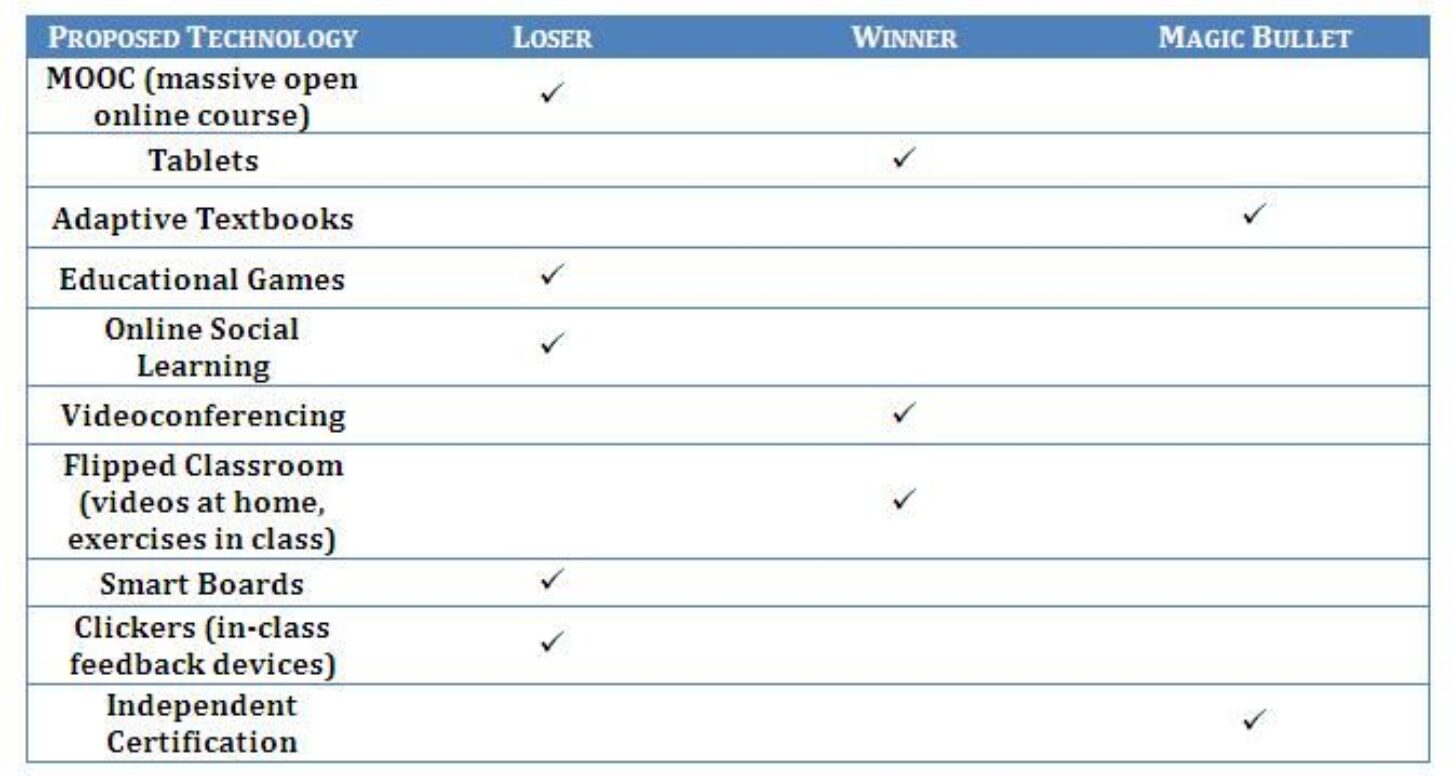
By Eric Wearne
Economics writer Arnold Kling recently discussed his views in The American on likely future winners and losers in the education technology / online learning sector. He has also thoughtfully written about online learning here, and here, for example. His thesis in The American article is that technologies that enable “one student [to receive] personalized instruction that comes from many educators” will be the real future of teaching, rather than technologies that allow one teacher to reach many more students.
Given that approach, Kling bets against MOOCs, just as others are doubling down on that strategy. Coursera has just doubled its list of partners, adding Emory, among many others. (See also here and here regarding MOOCs and higher education).
Is he right? Well, Kling may be right in his negative verdict on MOOCs as game-changers or as killer apps, but they do seem to have more value than he gives them credit for in this article. The fact that these courses exist online at all, and are available for free to anyone, anywhere, who wants to access them and to learn something surely is a positive outcome, even if most MOOCs’ retention rates are low and credentialing is (so far) non-existent. Monetizing MOOCs has been dififcult so far, but the fact that hundreds of thousands of people sign up for some of the better-known MOOCs surely suggests demand for something.

Ultimately, Kling thinks the most powerful successes – the “magic bullets” – are going to come from adaptive textbooks and independent certification. Given that high standard, he may be right here too. Some groups are currently working to make adaptive textbooks a practical reality. Devices like this are likely to make inroads into schools relatively quickly, as schools and policymakers are already very much looking for electronic content solutions to replace textbooks.
Other groups have been working through issues related to credentialing online learning. This concept faces a tougher path, as it will require both formal acceptance (by some state licensing agencies, for example), and also greater societal / marketplace acceptance.
Still, expecting any technology to be a “magic bullet” is a pretty high bar. For practical purposes, MOOCs and “flipped classes” will likely play a growing role in education for a while (while down on MOOCs, Kling labels flipped classes as “winners”). We are still very much in an experimental phase regarding online learning and new technologies, so Kling is wading into a good discussion that will help move our thinking along toward better education through higher technology, lower costs (both in money and in time), and better pedagogy.
(Eric Wearne is a Georgia Public Policy Foundation Senior Fellow and Assistant Professor at the Georgia Gwinnett College School of Education. Previously he was Deputy Director at the Georgia Governor’s Office of Student Achievement.)
By Eric Wearne
Economics writer Arnold Kling recently discussed his views in The American on likely future winners and losers in the education technology / online learning sector. He has also thoughtfully written about online learning here, and here, for example. His thesis in The American article is that technologies that enable “one student [to receive] personalized instruction that comes from many educators” will be the real future of teaching, rather than technologies that allow one teacher to reach many more students.
Given that approach, Kling bets against MOOCs, just as others are doubling down on that strategy. Coursera has just doubled its list of partners, adding Emory, among many others. (See also here and here regarding MOOCs and higher education).
Is he right? Well, Kling may be right in his negative verdict on MOOCs as game-changers or as killer apps, but they do seem to have more value than he gives them credit for in this article. The fact that these courses exist online at all, and are available for free to anyone, anywhere, who wants to access them and to learn something surely is a positive outcome, even if most MOOCs’ retention rates are low and credentialing is (so far) non-existent. Monetizing MOOCs has been dififcult so far, but the fact that hundreds of thousands of people sign up for some of the better-known MOOCs surely suggests demand for something.
Ultimately, Kling thinks the most powerful successes – the “magic bullets” – are going to come from adaptive textbooks and independent certification. Given that high standard, he may be right here too. Some groups are currently working to make adaptive textbooks a practical reality. Devices like this are likely to make inroads into schools relatively quickly, as schools and policymakers are already very much looking for electronic content solutions to replace textbooks.
Other groups have been working through issues related to credentialing online learning. This concept faces a tougher path, as it will require both formal acceptance (by some state licensing agencies, for example), and also greater societal / marketplace acceptance.
Still, expecting any technology to be a “magic bullet” is a pretty high bar. For practical purposes, MOOCs and “flipped classes” will likely play a growing role in education for a while (while down on MOOCs, Kling labels flipped classes as “winners”). We are still very much in an experimental phase regarding online learning and new technologies, so Kling is wading into a good discussion that will help move our thinking along toward better education through higher technology, lower costs (both in money and in time), and better pedagogy.
Eric Wearne is a Georgia Public Policy Foundation Senior Fellow and Assistant Professor at the Georgia Gwinnett College School of Education. Previously he was Deputy Director at the Georgia Governor’s Office of Student Achievement.

